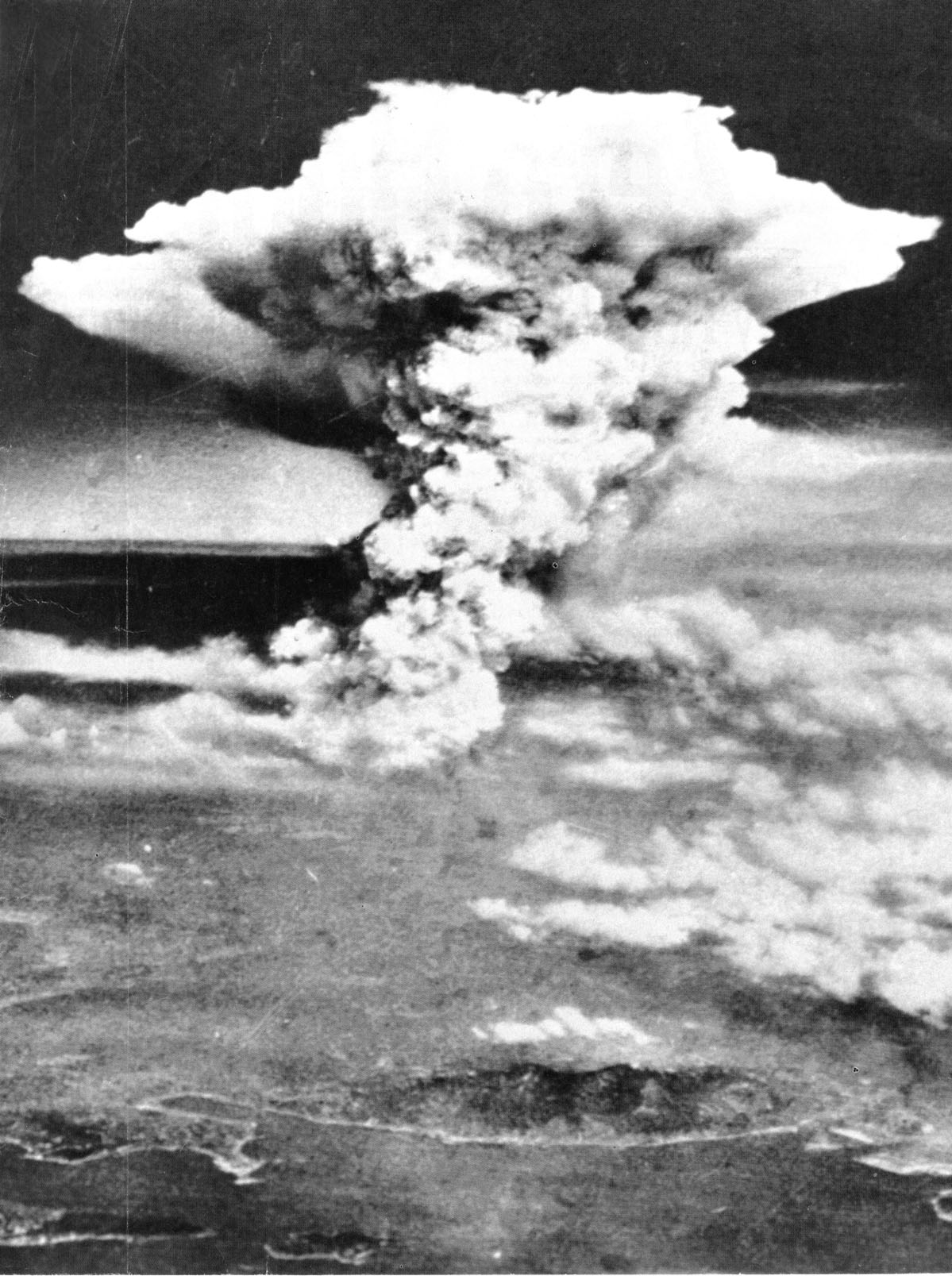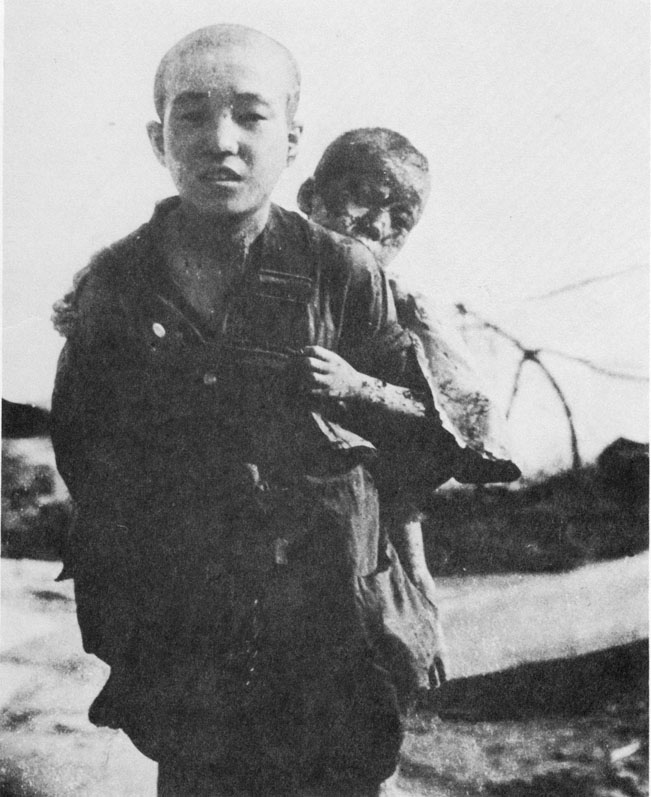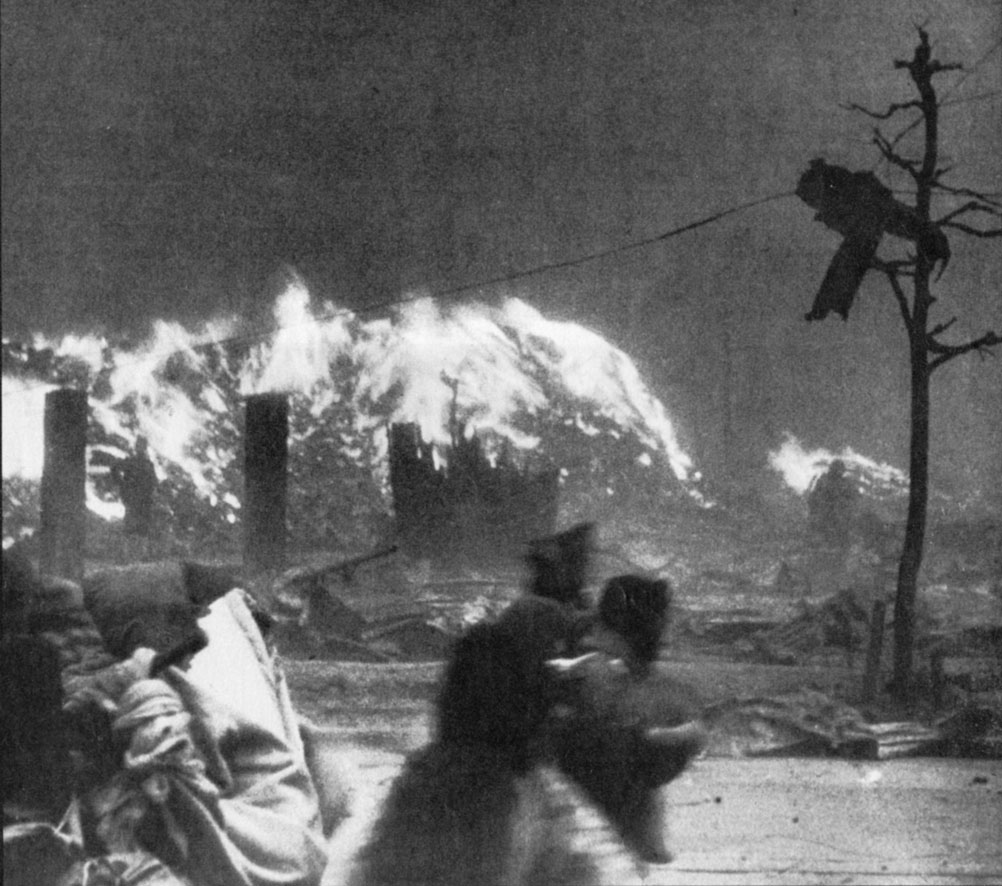From A World To Win News Service
Hiroshima and Nagasaki: The world's worst war crime and the countries willing to do it again
August 7, 2015 | Revolution Newspaper | revcom.us
3 August 2015. A World to Win News Service. "That fateful summer, 8:15. The roar of a B-29 breaks the morning calm. A parachute opens in the blue sky. Then suddenly, a flash, an enormous blast – silence – hell on earth.



Above: Survivors fleeing the firestorm after the atomic bombing of Hiroshima, 1945.
"The eyes of young girls watching the parachute melted. Their faces became giant charred blisters. The skin of people seeking help dangled from their fingernails. Their hair stood on end. Their clothes were ripped to shreds. People trapped in houses toppled by the blast were burned alive. Others died when their eyes and internal organs burst from their bodies. Hiroshima was a hell where those who somehow survived envied the dead." (From the 6 August 2007 memorial statement by Hiroshima mayor Tadatoshi Akiba, in a plea to rid the world of all nuclear weapons)
"A woman who covered her eyes from the flash lowered her hands to find the skin of her face had melted into her palms... Hundreds of field workers and others staggered by, moaning and crying. Some were missing body parts, and others were so badly burned that even though they were naked, Yoshida couldn't tell if they were men or women. He saw one person whose eyeballs hung down from his face, the sockets empty." (From Nagasaki, Life After Nuclear War, by Susan Southard, Viking, 2015)
Seventy years ago the United States became the first and only country to ever use nuclear weapons.
On 6 August 1945, an American bomber dropped a nuclear device over a hospital in Hiroshima, a Japanese city with little military significance. The bomb was attached to a parachute and set to go off high in the air to maximize the number of people who would be exposed to lethal radiation. About 140,000 city residents were killed or so badly injured they died within a few months.
When informed about the blast he had ordered, U.S. President Harry Truman gleefully exclaimed, "This is the greatest thing in history." To show just how "great" the atomic bomb was, three days later, on 9 August, the U.S. dropped another one, destroying the city of Nagasaki and killing another 70,000 people. Many years of suffering from cancer and other ills caused by radiation poisoning lay ahead for the survivors and their children. Susan Southard's new book, based on interviews with survivors over the last decade, recounts how some were so monstrously disfigured that children would run away from them. The fact that about 192,000 victims are still alive shows that this is not ancient history.
The U.S. occupied Japan after the war ended shortly after, and suppressed news articles recounting the horror that had occurred. Instead, newspapers like the New York Times parroted official lies, denying the existence of radiation sickness and downplaying the seriousness and special nature of the devastation caused by atomic weapons – which the U.S. government was then considering using on the USSR. The general in charge of developing the atom bomb told Congress that death by radiation was "a very pleasant way to die."
The U.S. unleashed the nuclear era in the closing days of the Second World War. Germany had already surrendered. Japan’s economy had been destroyed and its capital fire-bombed into ashes; its military had been dealt decisive defeats. Many historians believe that Japan would have surrendered without the atomic bombing. The purpose of the bombing was not just to make sure that the U.S. and its allies won the war, but even more, to make sure that the U.S. and the U.S. alone would benefit from Japan’s surrender.
The U.S. was determined not to let the Soviet Union prevent it from stepping into Japan’s shoes as the top colonial power in Asia. The USSR was still a socialist country then, although a decade later it would take a different path. It had been allied with the U.S. during the war against Germany and Japan, but even before the war was over the U.S. was baring its teeth to the USSR and setting out to dominate much of the world.
The USSR is no more but the U.S. and other countries still threaten the world with nuclear holocaust. The U.S., UK, France, Russia, China, India, Pakistan, North Korea and Israel hold thousands of nuclear warheads and the missiles, aircraft and submarines to use them. (Note: This list does not include Iran, despite the hysteria stoked by Truman's successor as U.S. president, Barack Obama.)
When Obama was campaigning for president in 2008, he promised he would seek nuclear disarmament. The committee that awarded him the Nobel Peace Prize the following year cited the agreement for a "nuclear-free world" he signed with Russia. (If Obama deserved the Nobel Peace Prize for this, so did Russian president Vladimir Putin.)
Yet the treaty sought no such thing. It permitted the two sides to each retain 1,550 strategic nuclear weapons deployed and ready to go, not counting those in storage. (Russia already had less than that.) Many are vastly more powerful than the bombs that devastated Hiroshima and Nagasaki. The thousands of tactical nuclear weapons not covered by the treaty are, in some ways, even more dangerous than the strategic ones, because their use is envisioned in ordinary official military doctrine, and once a nuclear exchange begins, no one can say how it will end. A nuclear world war is not now on the horizon, as it was at several points during the height of U.S.-Soviet contention for world domination in the 1960s through the 1980s, but still, the only reason to have nukes is to be able to use them.
Although the arms race between the U.S. and Russia today is no longer about an ever-accumulating stockpile of nuclear bombs, Obama has launched a trillion-dollar campaign to modernize his country's atomic bomb-making facilities, produce new or refurbished missiles, submarines and bombers to use them, and update existing warheads. Russia is reported to be updating its nuclear delivery vehicles. Similar efforts are being carried out by the UK (the modernisation of its nuclear arsenal and a new fleet of Trident ballistic missile submarines) and France (new air-to-ground nuclear-tipped missiles). Rather than working to consign nuclear weapons to the past, these programmes are meant to ensure their usability far into the future.
When asked to explain Obama's apparent turn-around, an advisor pointed to "Putin's invasion of Ukraine." (New York Times, 21 September 2014) This is a perfect example of the Cold War posture when each of the two imperialist superpowers was ready to risk destroying the world rather than lose the contest to run it. The implicit threat to use nuclear weapons to "protect" Ukraine – in other words, to keep Russia from challenging U.S. geo-political interests – is completely insane from the viewpoint of the interests of the population of Ukraine and the world.
As for combating Islamist terrorism, the current pretext for U.S. and European military intervention in the Middle East, if terrorism is defined as the killing of innocent civilians for a political purpose, then there has seldom been a terrorist act more horrendous in its consequences or on a bigger scale than the nuclear bombing of Hiroshima and Nagasaki.
A World to Win News Service is put out by A World to Win magazine, a political and theoretical review inspired by the formation of the Revolutionary Internationalist Movement, the embryonic center of the world's Marxist-Leninist-Maoist parties and organizations.
Volunteers Needed... for revcom.us and Revolution
If you like this article, subscribe, donate to and sustain Revolution newspaper.







